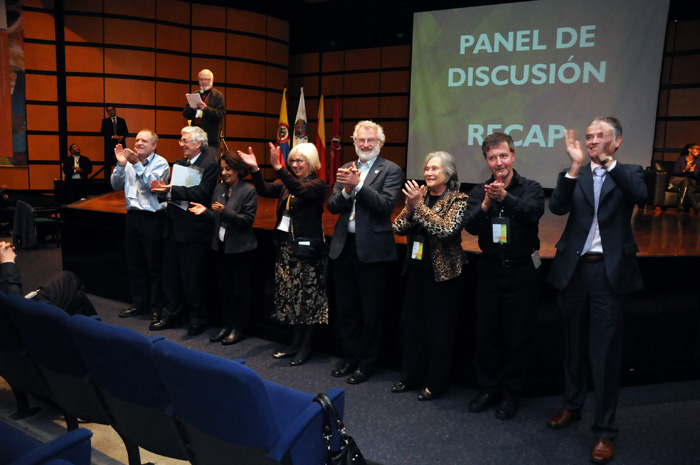This event, which counted on a massive attendance and active participation of scientists, journalists, professors, and university students, was organized by the International Council for Science (ICSU), the Colombian Academy of Exact, Physic and Natural Sciences (Accesfyn, for its acronym in Spanish), the International Center of Business and Exhibitions (Corferias) and Universidad Nacional de Colombia.
The objective of this event, which counted on the presence of the Nobel Prize 2002, Sir John Sulston, was to analyze the implications of the communication of the outcomes of science in two ways: on the one hand, the transparency and reliability of the information that is shared among scientists, and, on the other hand, the obligation of transmitting knowledge to society, in a clear and simple way.
Science communication: a contemporary challenge
The communication of scientific knowledge to society is one of the biggest contemporary challenges. According to the main discussions performed in the two day forum, it is evident that there is a multiple tension, which blocks constructive dialogue between scientists and journalists, who are responsible for publishing scientific advances and debates in the media.
The problems to establish a fluid relation between scientists and journalists have been constant during several decades. There are two important elements to understand this distancing: first, the mutual distrust, and second, the lack of interests to understand the different roles and complexities both scientist and journalist have.
Within this context, several recommendations were made. Andrew Pleasant, a professor from several universities such as Cornel University, Brown University and Rutgers University, asserted that scientists have to accept that science is just one perspective to understand the world among other different perspectives people have.
In addition, Germán Velásquez, staff member of the South Centre, invited everyone to admit that science also makes mistakes. He reminded the audience that the statement made by the World Health Organization regarding the AH1N1 virus as a pandemic caused big problems to the world"s public health and economy.
Velásquez also affirmed that thousands of vaccines that governments bought would have to be destroyed after the WHO reduced the alarm. "How much money has been thrown away" How many people died due to other diseases which did not receive the necessary resources"" all these questions were asked during his presentation at the forum.
In addition, the journalist Alejandro Santos, director of Semana magazine, synthesized four big myths that have to be reconceived: 1) science is boring, 2) it does not produce news, 3) it is exclusive for scientists, and 4) it has nothing to do with the real world since the analysis are always theoretical.
In addition, Lisbeth Fog, a SciDev.Net (Science and Development Network) correspondent in Colombia, asserted that it is important for journalists to specialize in communication of scientific topics.
These ideas were shared by the scientists in the audience. They also affirmed that society requires a deep and fluid relation between the media and the scientists. This relation must allow knowing the results of the investigations in an understandable and agile way.
The importance of the forum
The event was divided in four sessions, each with three brilliant lectures, followed by a panel in which the lecturers discussed and answer the audience"s questions.
Among the topics they discussed are the following: Responsibility of the academy and its communication with peers, Communication of science to society, and New forms of acquisition and communication of knowledge (especially through the Internet).
In this event, Colombia fulfilled its objectives as host of the International Council for Science (ICSU), conformed by 119 scientific bodies of national standing and 30 international scientific unions.
 Correo Electrónico
Correo Electrónico
 DNINFOA - SIA
DNINFOA - SIA
 Bibliotecas
Bibliotecas
 Convocatorias
Convocatorias
 Identidad UNAL
Identidad UNAL



